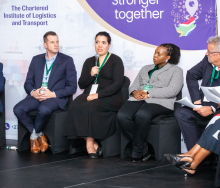Cape Town is facing equipment shortages at the port's container terminal (CTCT) due to “major engine failures” that halted import collections this week.
TPT advised port users on Tuesday night that import collections would be stopped from 06:00 on Wednesday until 06:00 on Thursday because higher-than-normal temperatures were contributing to a breakdown of port equipment. It told port users that the decision to halt import collections would help to alleviate truck congestion.
TPT did not respond to questions from Freight News this week regarding the stoppage and when it would be fully lifted.
However, in a communiqué TPT’s Western Cape managing executive Andiswa Dlanga sent to port stakeholders on Thursday, it emerged that the port has been struggling with equipment availability for several weeks.
“Since the end of July 2023, the terminal has seen a reduction in the availability of rubber-tyred gantries (RTGs) to 15 RTGs as a result of major engine failures on seven RTGs, impacting both waterside and landside operations,” Dlanga said.
“We wish to assure you that the engineering team, together with the Original Equipment Manufacturer (OEM), are working day and night to remedy the situation. The terminal is continuing to undertake planned maintenance activities on the current available fleet to improve reliability.”
Dlanga said several interventions had been put in place to improve equipment availability, including the signing of a spares supply contract on July 1 “to address running breakdowns and planned maintenance activities”.
“The engines of the RTGs are now obsolete and have reached end of useful life. The OEM is
currently running compatibility tests with a new generation engine; this process will be completed by the end of this week,” he said.
The terminal and the OEM will complete the installation of the new generation engine on the first RTG and a contract for the refurbishment of an additional five RTGs is due to be awarded on September 5.
“We will perform an endurance test for 24 hours and thereafter assess the performance. The new engines for the remaining six RTGs will be delivered this month and their installation will be concluded by mid-October 2023,” he said.
The port is also procuring an additional seven RTGs to supplement the current fleet, with delivery expected by mid-November.
“As of this morning, we have 13 RTGs available in operation and expect the 15th RTG to be released by 3 September 2023. However, as a result of the disrepair, the reliability is a significant challenge,” Dlanga said.
He added that the port currently had eight of nine ship-to-shore (STS) cranes available.
“Ship to Shore 04 (LC4) is expected to be commissioned on 4 September 2023. We anticipate the appointment of the OEM as the primary maintenance team of port STS cranes by October 2023. We are shifting the responsibility for reliability and availability onto the OEM,” Dlanga said.
He added that the terminal was committed to its medium- to long-term equipment replacement strategy which would see a contract awarded to a successful OEM by the end of this month.
“When the season starts, we will have 28 RTGs and the OEM will be in place to maintain the fleet, ensuring greater reliability,” he said.













